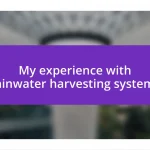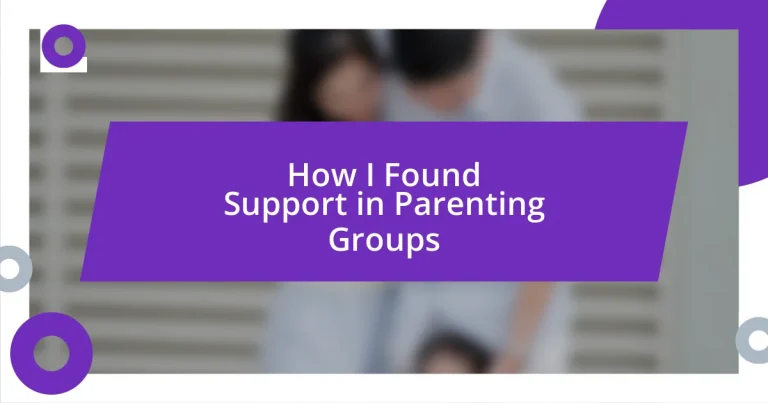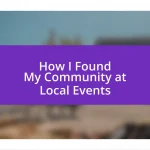Key takeaways:
- Parenting groups foster a sense of community, providing emotional support and shared experiences that reassure members they are not alone in their struggles.
- Finding the right parenting group is crucial; focus on group alignment with personal needs, including challenges faced, meeting style, size, and overall atmosphere.
- Active participation and vulnerability within groups strengthen connections, promote diverse perspectives, and create lasting friendships and a reliable support network.
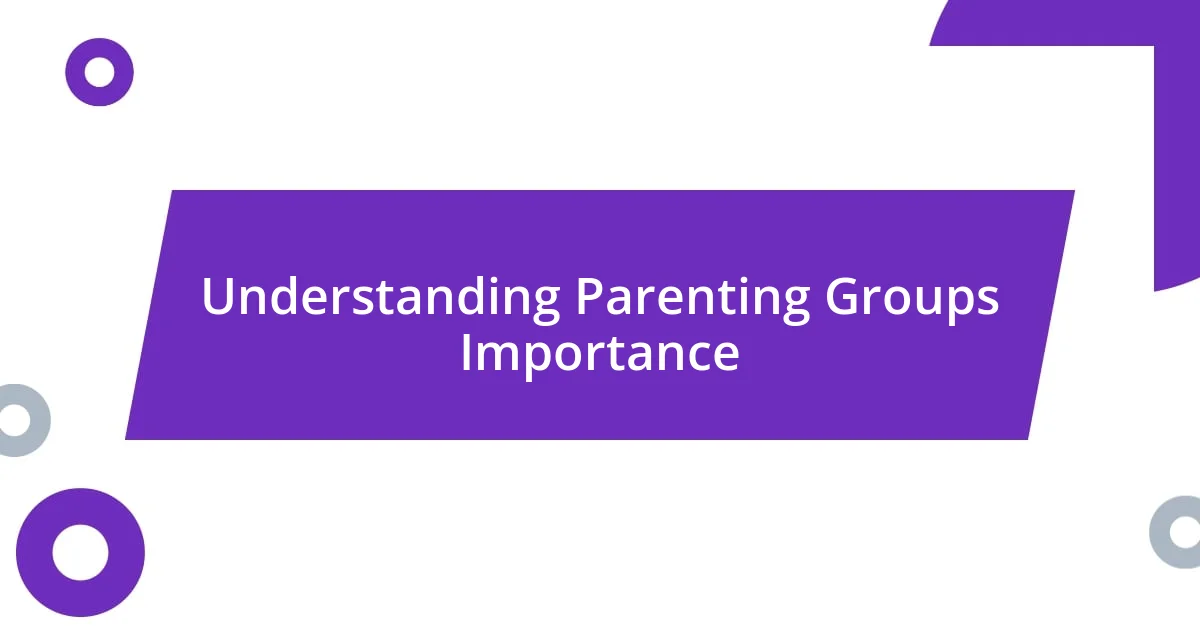
Understanding Parenting Groups Importance
When I first joined a parenting group, I felt an overwhelming sense of relief wash over me. Here were people who understood the ups and downs of parenting, just like I did, sharing their struggles and triumphs. Have you ever felt like no one could possibly understand what you’re going through? That shared experience creates a powerful bond and reassures us that we’re not alone in this journey.
The importance of parenting groups goes beyond just finding camaraderie; they also offer practical guidance. I remember one meeting where a fellow parent shared a simple technique that drastically improved my child’s bedtime routine. It was a “lightbulb moment” for me, sparking the realization that sometimes, it just takes one piece of advice to shift our perspective. Isn’t it incredible how a small change can make such a big difference?
Moreover, these groups foster a safe environment for emotional expression. I vividly recall a moment when I shared my feelings of inadequacy as a parent, and the others responded with kindness and understanding. Isn’t it amazing how expressing our vulnerabilities can lead to deeper connections? By allowing ourselves to be real, we not only support each other but also grow together, strengthening our parenting skills one shared experience at a time.
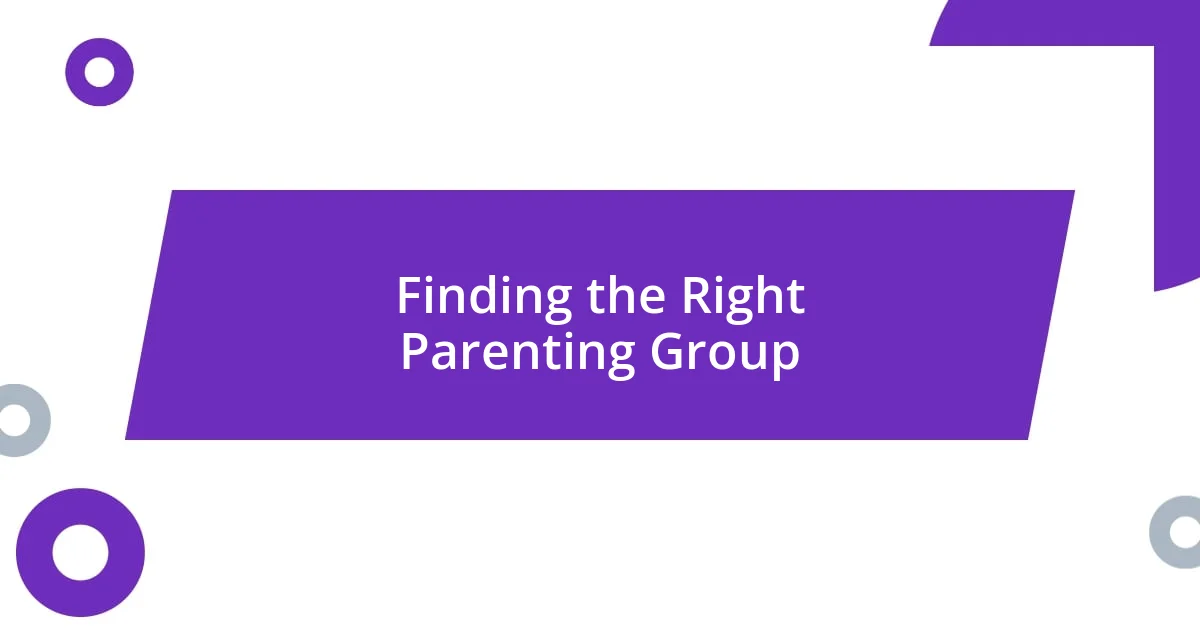
Finding the Right Parenting Group
Finding the right parenting group can feel like searching for a needle in a haystack, but it’s worth the effort. Initially, I trialed a few groups that didn’t quite resonate with me. I’ll never forget the first one I attended where the atmosphere felt disorganized and the discussions were scattered. I left feeling more confused than supported. It’s crucial to prioritize your needs and find a group where the focus aligns with your parenting style.
Here are some aspects to consider when choosing the right fit:
- Group Focus: Look for a group that targets your specific parenting challenges, whether it’s new parenting, behavior issues, or special needs.
- Meeting Style: Consider if you prefer structured meetings with planned topics or more informal, open discussions.
- Group Size: A smaller group might feel more intimate and supportive, while larger groups can provide a wider range of perspectives.
- Tone and Vibe: Pay attention to the group’s culture. Is it encouraging, non-judgmental, and friendly? That’s vital for your comfort.
- Location and Accessibility: Choose a group that’s easy for you to attend regularly, whether in-person or online.
Finding the right parenting group is not just about practicality; it’s about connecting with others who elevate your parenting journey. I remember how relieved I felt when I stumbled upon a group that emphasized compassion and shared experiences. Suddenly, I was surrounded by moms and dads who didn’t just offer advice but genuinely listened and cared. It was refreshing to feel understood on such a profound level.
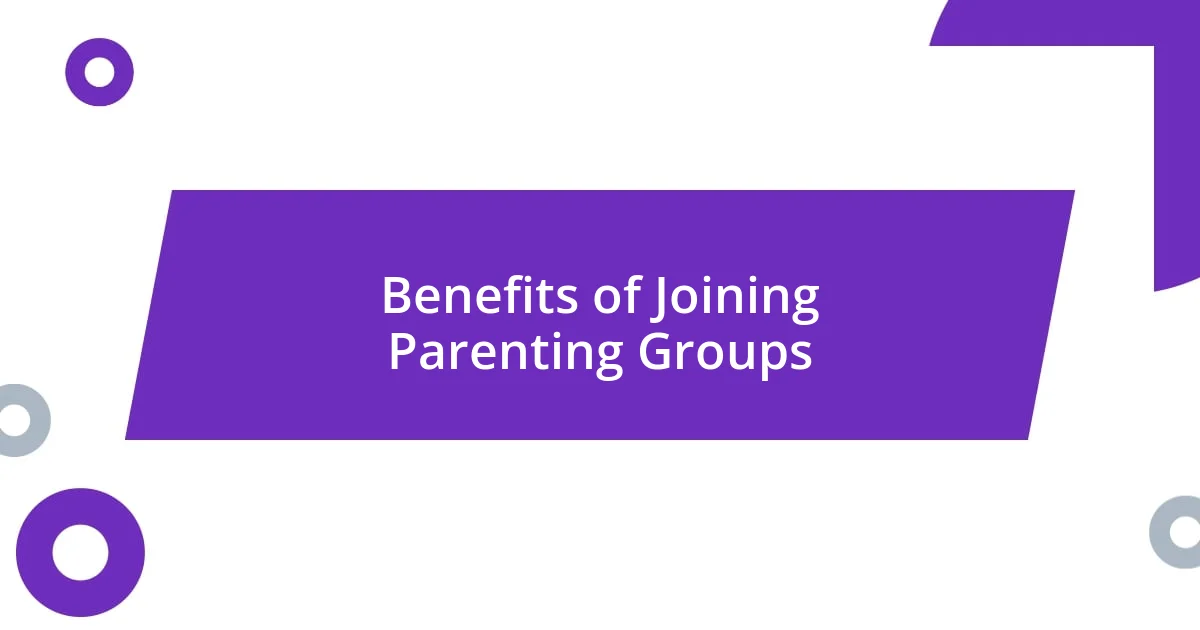
Benefits of Joining Parenting Groups
Joining parenting groups opens up a world of support and shared wisdom. One of the most significant benefits I’ve found is the wealth of different perspectives. At one meeting, a parent shared their approach to handling sibling rivalry, which was completely different from what I had tried. Listening to diverse strategies allowed me to adopt innovative techniques that genuinely transformed interactions in my household. Have you ever felt stuck in a rut and wondered if others faced the same issues? Those moments of shared knowledge can be enlightening.
Another vital aspect of parenting groups is the emotional safety net they provide. When I renegotiated my parenting expectations after a particularly rough night with my toddler, I found solace in hearing others express similar experiences. We often feel pressure to portray perfect parenting, but it was liberating to realize that we all face challenges. That authenticity helped build deeper relationships, creating a comforting space where I could openly discuss my feelings without judgment. Isn’t it reassuring to connect with others who validate your struggles?
Beyond emotional support and practical advice, parenting groups can foster lasting friendships. I’ll never forget the day we organized a playdate after meeting in the group. What started as a simple gathering evolved into a supportive bond. We would share meals, exchange tips, and help each other navigate parenting dilemmas long after the initial group closed. These relationships transform from mere acquaintances into a reliable community that you can lean on during tumultuous times. Don’t you think having that kind of support system is invaluable?
| Benefit | Description |
|---|---|
| Diverse Perspectives | Exposure to a variety of parenting strategies and solutions from fellow members. |
| Emotional Support | A safe space to share vulnerabilities and connect with others experiencing similar challenges. |
| Friendship and Community | Opportunities to form lasting bonds and create a reliable support network. |

How to Maximize Group Engagement
Engaging effectively in parenting groups takes a bit of finesse. From my own experience, I’ve found that participating actively really makes a difference. When I started sharing my thoughts, whether on a parenting challenge or a victory, I noticed others became more inclined to share their insights too. It’s like igniting a spark; the more you contribute, the more others feel encouraged to join the conversation. Have you ever realized how much a simple question can open up a dialogue? It’s quite remarkable!
Creating a welcoming environment is also key. I recall a session where one parent admitted feeling overwhelmed, and instead of merely offering advice, we all leaned in, listening intently. This genuine connection encouraged others to express their vulnerabilities, making the entire group stronger. I believe that vulnerability breeds trust; when we show our real selves, others are more likely to reciprocate. Were you ever in a group where you felt completely at ease? That powerful comfort is what makes parenting groups truly effective.
Lastly, I can’t stress enough the importance of varied group activities. We once organized a fun workshop focusing on mindful parenting techniques, which dramatically differed from our usual discussions. It was so refreshing! I found that mixing it up not only keeps things engaging but allows for dynamic interactions. There’s something magical about learning together in a hands-on approach, don’t you think? By introducing different formats, you’re not just maximizing engagement; you’re creating memorable experiences that everyone will cherish.
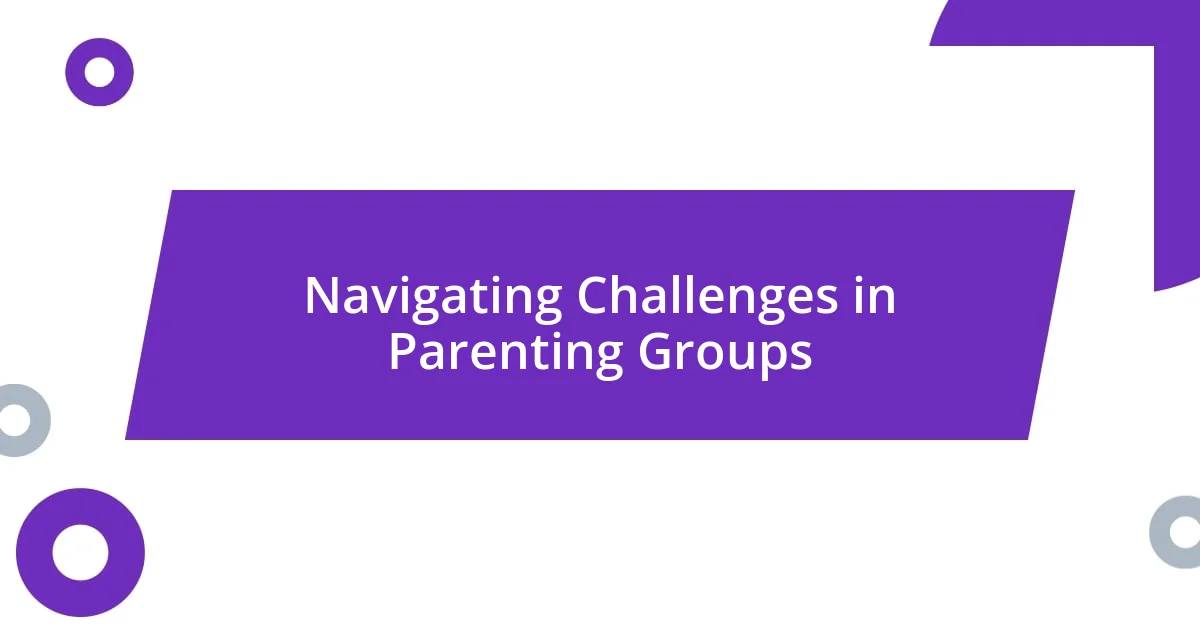
Navigating Challenges in Parenting Groups
Navigating the challenges that arise in parenting groups can be a bit daunting, yet it’s often where some of my most profound moments of growth occur. I distinctly remember one session where we were discussing the struggles of balancing work and parenting. As members began to share their stories, I realized I wasn’t alone in feeling overwhelmed. It felt like lifting a weight off my shoulders when several parents expressed similar frustrations. How often do we underestimate the power of simply hearing that someone else understands?
Sometimes, I’ve encountered varying opinions that provoke discomfort. For instance, at one meeting, a heated debate emerged over screen time limits for kids. Initially, I felt a surge of defensiveness, as if I was being scrutinized for my own choices. Reflecting on that moment, I realized that such discussions, although challenging, force us to confront our beliefs and assess them critically. Isn’t it interesting how discomfort can lead to deeper understanding and clarity?
I’ve also faced the challenge of shyness in group settings. In the beginning, I hesitated to voice my thoughts, fearing judgment or dismissal. However, I remember a pivotal moment when another shy parent encouraged me to speak up. Taking that leap felt liberating! This taught me the importance of support and encouragement within the group, transforming both my confidence and my connection with others. Could embracing our vulnerabilities actually strengthen our relationships? It certainly has for me.
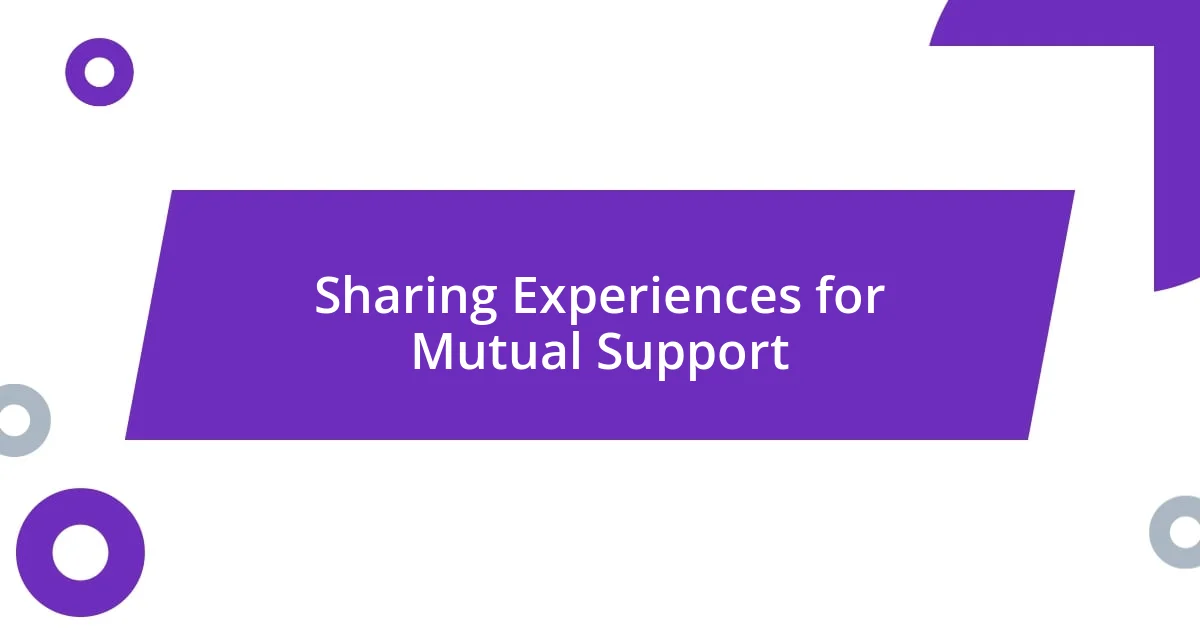
Sharing Experiences for Mutual Support
Sharing experiences in parenting groups has been a revelation for me. I vividly remember a moment when a fellow parent recounted a particularly tough day with their child, prompting me to share a similar story about my own struggles. Suddenly, it felt like a weight lifted off not just my shoulders, but our collective burden as others nodded in understanding. It’s interesting how that shared vulnerability can create an instant bond, isn’t it?
In those moments of openness, I found comfort knowing that my challenges were echoed by others. One time, we were discussing sleep issues, and I admitted to having sleepless nights filled with worry. The look of camaraderie in the room was palpable; it was as if we had formed our own little support network right then and there. I often wonder, how many parents silently grapple with their struggles, wishing for just one person to say, “I’ve been there too”?
I also cherish the invaluable lessons learned through storytelling within our group. There was a session where we all shared our parenting “oops” moments, and I couldn’t believe how much laughter erupted from those tales. It highlighted how no one is perfect, and that realization made me feel a deep sense of relief. Isn’t it wonderful that humor can pave the way for connection? By sharing our experiences, we not only validate each other’s feelings but also cultivate a warm, supportive atmosphere that invites growth and understanding.
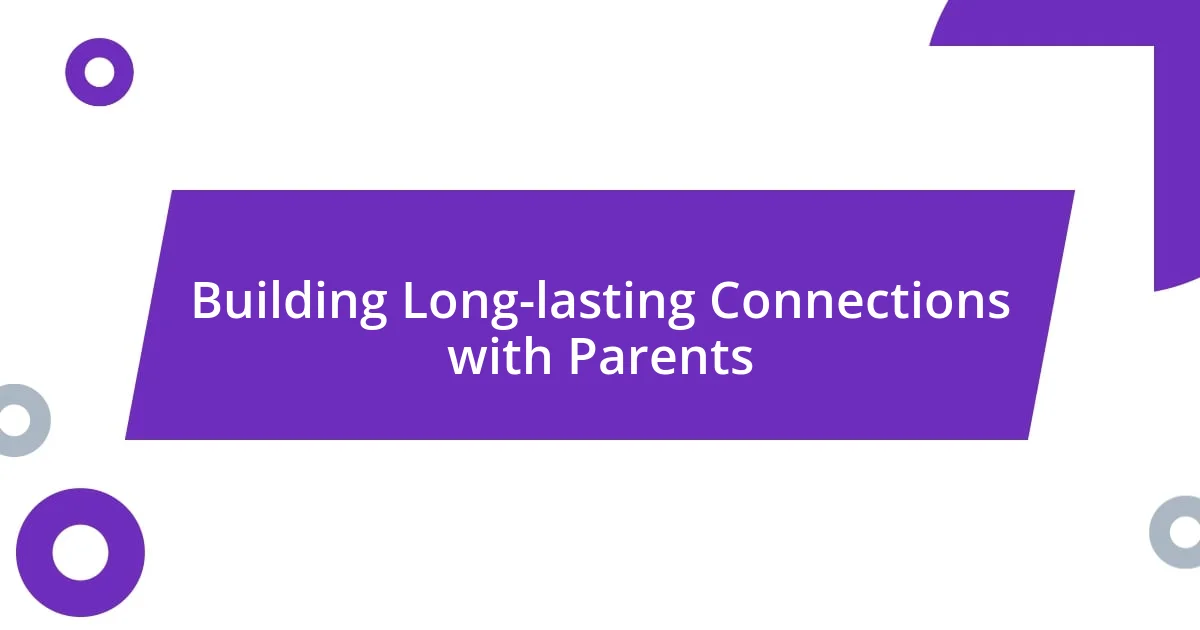
Building Long-lasting Connections with Parents
Building long-lasting connections with other parents often starts with finding common ground. I remember one particular gathering where we shared our journeys into parenthood. As stories unfolded around the room, it was striking how many of us felt the same excitement and fear. That moment reinforced a powerful truth: we are more connected than we might realize. Isn’t it fascinating how these shared experiences can lay the foundation for deep relationships?
Over time, I’ve noticed that these bonds grow stronger when we create a safe space for honesty. I recall a day when a mother, visibly upset, opened up about her struggles with postpartum anxiety. The room shifted, the atmosphere charged with empathy. It inspired others, myself included, to express our own vulnerabilities. In moments like these, the group transforms into a sanctuary where we can be our authentic selves. Can there be anything more comforting than knowing that someone else truly understands your journey?
What has truly amazed me is how these connections extend beyond the group meetings. I’ve found myself reaching out to fellow parents for advice, or even just to chat on a tough day. I vividly remember a late-night text to a friend from the group, sharing a moment of frustration. Their swift response reminded me that support doesn’t end at the close of a session; it blossoms into friendships that withstand the test of time. Isn’t it incredible how these relationships can evolve into a valuable network that enriches not just our parenting skills, but our lives as a whole?








